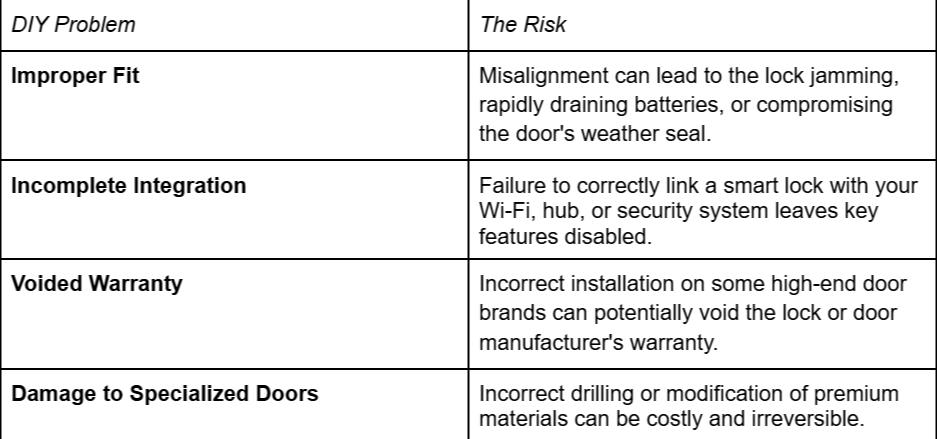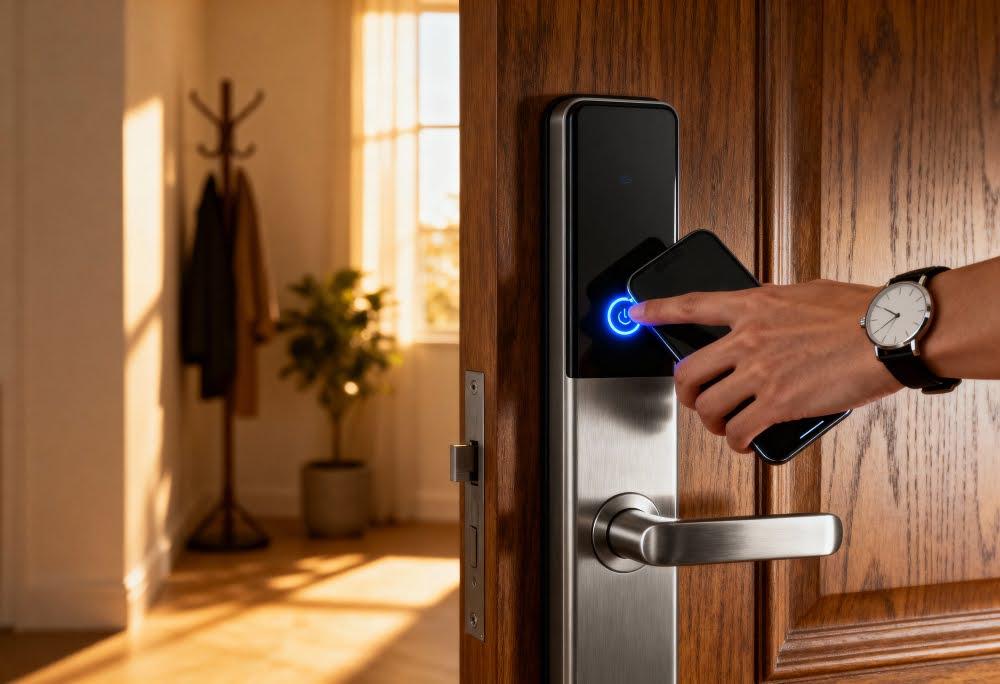Tired of fumbling for your keys with an armload of groceries? Worried about a spare key hidden under the mat? In today's digital world, traditional lock-and-key systems are quickly becoming a thing of the past.
Homeowners are now opting for a front door lock with keyless entry, an electronic solution that eliminates the need for a physical key. Instead, you gain access using a personalized code on a keypad, a smartphone app, a key fob, or even your fingerprint.
Join us as we take a closer look at keyless locks and explore how upgrading your door's hardware can simplify your life, all while strengthening your home's security.
Types of Keyless Entry Home Door Locks
Keyless entry is not a one-size-fits-all solution. As the technology has evolved, so have the options, giving every homeowner the perfect way to ditch their physical keys. Here is a breakdown of the most popular types of keyless entry door locks on the market today.
Keypad Locks
The most common (and affordable) type of keyless entry, keypad locks rely on a simple mechanism: a numeric code. You program a unique PIN into the lock's digital or mechanical buttons.
This is a reliable, straightforward option that is perfect for shared family access or temporary codes for service providers, as you can easily change the code whenever necessary.
Smart Locks
Smart locks are the most popular upgrade for the modern home. These locks connect to your home Wi-Fi or use Bluetooth, allowing you to control and monitor your door from a dedicated smartphone app, regardless of your location.
Features include real-time notifications, remote locking and unlocking, and integration with other smart home systems like Alexa or Google Home.
Biometric Locks
Offering the highest level of personalized security, biometric locks use your unique biological data (typically a fingerprint) to grant access. This eliminates the risk of a code being guessed or a key being stolen. Simply place your finger on the scanner, and the door unlocks.
Because they are incredibly convenient and fast, biometric locks are a great choice for primary entry points.
Proximity/RFID Locks
Next, we have Radio-Frequency Identification (RFID) technology. Access is granted when a small, pre-programmed device like a key fob or an access card is brought near the lock sensor.
These systems are often seen in commercial buildings, but are becoming popular in residential settings as well – especially for those who prefer to carry a small fob rather than remember a code.
Hybrid Options
Why choose just one? Keyless entry door locks can also be hybrids, incorporating two or more methods into a single unit.
For example, a lock might feature both a keypad and a traditional key cylinder for a backup, or a smart lock may combine smartphone control with a fingerprint scanner.
Why Keyless Entry Door Locks are the New Standard
Switching to a keyless entry system is a fundamental upgrade to the overall security, convenience, and functionality of your home.
Say Goodbye to Lost Keys
No more fumbling in your bag, making emergency calls, or worrying about your children losing their house key at school. With keyless entry door locks, you have multiple convenient ways to access your home, whether it's punching in a code, tapping your phone, or using your fingerprint.
Total Access Control and Monitoring
Keyless systems give you control over who enters your property and when. You can assign unique codes to family members, dog walkers, or maintenance workers and easily deactivate them instantly.
Certain smart locks further provide a real-time activity log, allowing you to see exactly who unlocked the door and at what time, giving you a complete audit trail for your front door.
Integration with Smart Home Systems
Keyless locks are also an important part of a cohesive smart home ecosystem. They easily integrate with platforms like Amazon Alexa, Google Home, and other security systems.
The result is powerful automation: you can set your lights to turn on, your thermostat to adjust, or your security system to disarm all with the simple action of unlocking your front door.
Are Keyless Entry Door Locks Safe?
While the idea of an electronic lock may raise concerns, modern keyless systems are engineered with safety as their top priority. In fact, keyless entry locks offer superior security.
- Immunity to Common Attacks: Traditional locks are vulnerable to physical attacks like lock picking and key bumping (a specially cut key, tapped with force, to align the pins in a traditional lock and turn the cylinder open). Since most keyless locks lack an accessible keyhole, they are immune to these methods.
- Tamper-Proofing: High-quality smart locks feature built-in alarms that sound an alert if someone attempts to tamper with or forcibly remove the lock.
- No Risk of Duplication: The biggest security risk of a traditional key is that it can be lost, stolen, or easily copied. With a digital code, a fingerprint, or a secure smartphone app, the "key" cannot be physically duplicated.
Encryption and Hacking Concerns
The risk of a cyberattack is one of the most common concerns for smart-home technology, but reputable manufacturers take this seriously.
Many smart locks secure their communication between the lock and your phone using military-grade encryption protocols, such as Advanced Encryption Standard (AES) 128-bit. This makes the data nearly impossible for an unauthorized person to intercept and decode.
What Happens During Power Outages?
The good news is that keyless entry door locks are designed to remain fully functional even if your home loses electrical power. Nearly all residential keyless entry locks are battery-powered (typically AA batteries). Since they run on their own internal power supply, they are unaffected by blackouts that take out your main electricity or Wi-Fi router.
The smart locks on today's market also feature redundancy to prevent being locked out. For instance, the lock and its companion app will send you multiple warnings months in advance when the battery is running low. But if the battery should ever run out, there are typically hidden terminals where you can touch a standard 9-volt battery to jump-start the lock and gain temporary access.
For homeowners who may still be concerned, hybrid locks are the answer; they include a traditional key cylinder as a final, mechanical failsafe in case all electronic methods fail.
Installation Considerations: Professional Vs. DIY
While quite a few electronic locks are sold as "DIY friendly," choosing professional installation is the best way to guarantee security, reliability, and functionality from day one.

Choosing the Right Keyless Lock
- Design and Hardware: When selecting a lock, decide on the style. Do you prefer a slim deadbolt or a fully integrated keyless entry door lock with handles? Consider the finish and design to be sure it complements your home's aesthetic.
- Budget and Feature Needs: Keypad-only locks offer great basic functionality and affordability. Full smart locks cost more but provide valuable features like remote control, activity logs, and integration with other systems.
- Tech Comfort: If your family prefers simple operation, a keypad or biometric lock offers fast, local access. If you are invested in a smart home, prioritize keyless entry door locks that integrate directly.
- Family and Guest Needs: Consider how many people need access. A lock that supports multiple unique access codes is essential for kids and short-term guests.
Integration for Premium Doors
Hodges proudly specializes in premium door brands, with a focus on integrating new technology with your specific locking mechanisms.

Troubleshooting Keyless Entry Door Lock Issues
Keyless entry door locks are generally reliable, but occasional issues can arise. Fortunately, most common problems have simple solutions!
Lock is Slow or Unresponsive
The issue here is often a low battery or mechanical friction caused by door misalignment, with the first step being to replace the batteries.
If the issue persists, contact the Hodges team; we can inspect and adjust the door's alignment, which prevents mechanical drag that rapidly drains batteries.
App Won't Lock or Unlock Remotely
You likely have a Wi-Fi connectivity issue or outdated firmware. First, check that your home router is working correctly. Then, try performing a simple restart of the lock and check its app for any available firmware updates, which often resolve connectivity bugs.
Lock Rejects a Valid Code
The cause is probably a minor software glitch or temporary network interruption. In this case, simply perform a quick reset of the lock, and then re-enter the code. This should restore standard functionality quickly.
Cost Analysis for Keyless Entry Door Locks
While the initial cost of a keyless entry system is higher than a standard lock and key, the long-term value and convenience they provide make them a worthwhile upgrade for any modern homeowner.
Initial Investment
Note that the initial price of keyless entry door locks will vary significantly based on the technology you choose.
Basic keypad locks, for example, are the most budget-friendly option and generally start in the $100-$150 bracket. Conversely, high-end models with built-in Wi-Fi, biometric scanners, and advanced encryption range from $200-$400.
Long-Term Value
The long-term value of a keyless entry system quickly outweighs the initial investment. You achieve substantial savings over the lifespan of the lock primarily by eliminating costly rekeying fees, since access is managed digitally; you'll never need a locksmith when a key is lost or duplicated.
Furthermore, many homeowners benefit from insurance discounts offered by providers for installing high-security smart locks that are integrated with a monitored alarm system.
And perhaps most importantly, the combination of convenience and time saved delivers a priceless amount of peace of mind.
Go Keyless with Hodges Windows and Doors
Stop fumbling for keys and start unlocking with ease. At Hodges Windows and Doors, our professional team guarantees an integrated setup that protects your door's warranty. Contact us today to lock in your upgrade with a free quote!


